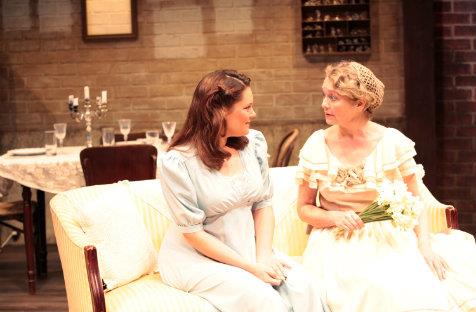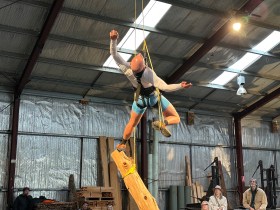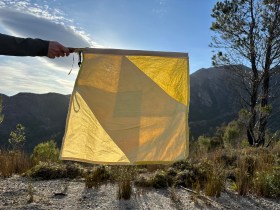This 1944 Tennessee Williams ‘memory play’, regarded as one of the most autobiographical of his early works, transports us to St Louis of the 1930’s and in this production is performed with ‘correct’ American accents.
Tom (the very handsome Tom Stokes), who acts as narrator, is a dreamy would-be poet stuck in a dead end job in a shoe warehouse, dreaming of escape and adventure. He painfully shows us that ‘truth in the pleasant disguise of illusion’.
Tom’s mother, Amanda, (Vanessa Downing) is a desiccated Southern Belle, foreshadowing the Blanche DuBois-style characters to come in Williams’ later plays. She is dominating, overbearing and nitpicking, driving Tom – and the audience – to distraction. Amanda’s husband abandoned her 16 years ago, leaving her with two children. She has a wonderful scene in Act 1 where she enthusiastically quizzes Tom, Lady Bracknell-like, about the friend he is bringing home for dinner. Her Act 2 descent into madness, Miss Havisham-like, all dolled up in ringlets and an unflattering girlish dress, is embarrassing and horrifying – another of my colleagues called it ‘monstrous’ – but also to be greatly pitied, and a tremendous performance.
Laura, Tom’s sister (Catherine McGraffin) is a shy, limping recluse whose large collection of glass figurines symbolise her dreams of escape and the fragility of her situation.
Needling and wheedling from Amanda eventually leads to Tom bringing a ‘gentleman caller’, a friend from work, home for dinner to meet Laura. But unfortunately Amanda’s high hopes of a suitable partner for her daughter are dashed.
Will Laura remain trapped in her predictable, dreary life or will she get a chance to escape too?
In one of the show’s excellent scenes, romantically candlelit, after a rather disastrous supper, Laura blossoms and becomes radiant and inspired, thriving under the gentle attention given to her by Jim O’Connor ( the ‘gentleman caller’ ), played as handsome, ever so courteous and charming by Eric Beecroft. He is encouraging and thoughtful, but already ‘spoken for’.
Designs include dreary painted walls and a fire escape (leading to some rather unusual and awkward entrances and exits) a squashed living room separated from the dining table area by a large cheesecloth curtain – which leads to some interesting effects but does not quite work – and includes a large, wind-up gramophone. Laura’s huge collection of glass animals, which gives rise to the play’s title, is relegated to a side wall.
The Glass Menagerie is all about the shattering and fragility of dreams and the unfairness of life. The subtle, nuanced acting by all four cast members is excellent; they do great things with this uneasy, disturbing play.
Rating: 4 stars out of 5
The Glass Menagerie
By Tennessee Williams
Director: Mark Kilmurry
Designer: Lucilla Smith
Lighting Designer: Nicholas Higgins
Stage Manager: Erin Harvey
Wardrobe coordinator: Lisa Mimmocchi
Dialect coach: Natasha McNamara
Cast: Eric Beecroft, Vanessa Downing, Catherine McGraffin and Tom Stokes
Running time: 2 hours 20 (approx) including one interval
Ensemble Theatre, Kirribilli
11 July – 10 August





